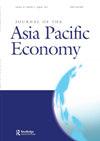Trade credit and corporate investment: enhancing value creation
IF 1.5
4区 经济学
Q3 ECONOMICS
引用次数: 0
Abstract
AbstractThis study explores the moderating role of trade credit in the value-creation process of firms. Through panel data analysis of annual data from publicly listed firms in ten developing Asian economies, we found that both investing in capacity expansion and engaging in trade credit activity positively impact the value creation process. However, the combination of capacity expansion and trade credit leads to enhanced value creation. The findings highlight the roles played by both borrowed and supplied trade credit in this process. By examining the role of trade credit as a catalyst between corporate investment and value creation, this study provides valuable insights for policymakers and practitioners. The results suggest that firms in these economies should consider increasing their trade finance activity to achieve higher value through capacity expansion. To ensure the validity of the findings, the study conducts a series of robustness checks, including alternative regression specifications, different measures of the key variables, and diverse sample compositions.Keywords: Alternative financingcorporate growthdeveloping economiestrade creditvalue creationJEL CLASSİFİCATİON: G01G30G32 Disclosure statementNo potential conflict of interest was reported by the authors.Notes1 The current research utilizes the term “growth” to denote the increase in value-added, which is computed using the following formula: growthijt= (EBITDAijt−EBITDAijt−1)EBITDAijt−1. Hence, the terms “value creation” and “growth” are used interchangeably, as has been demonstrated in studies by Ferrando and Mullier (2013) and Tingbani et al. (Citation2022).2 EBITDA, Sales and TC variables are adjusted for inflation.3 The difference GMM estimations are executed in Stata using the “xtabond2” command developed by Roodman (Citation2009).4 To avoid overcrowding this table, we will report the coefficients for the remaining control variables including once-lagged dependent variable in the next section in Table 2, while keeping the reader's attention focused on the key variables.5 All estimations are conducted with the rest of the explanatory variables, constant and times dummies.Additional informationNotes on contributorsBahadır KarakoçDr. Bahadır Karakoç is a finance scholar with a Ph.D. degree in the field. His research interests include corporate finance, corporate governance, financial management, and financial literacy. He has published several papers on these subjects, which have appeared in reputable peer-reviewed journals. He has been invited to speak at numerous conferences and seminars, where he has shared his insights on the latest developments in finance. He has also served as a reviewer for several academic journals. Currently, Dr. Karakoç is a faculty member at Samsun University, Economics and Finance Department, where he teaches finance courses to undergraduate and graduate students.贸易信贷与企业投资:促进价值创造
摘要本研究探讨贸易信用在企业价值创造过程中的调节作用。通过对亚洲10个发展中经济体上市公司年度数据的面板数据分析,我们发现投资于产能扩张和参与贸易信贷活动都对价值创造过程产生积极影响。然而,产能扩张和贸易信贷的结合导致了价值创造的增强。研究结果强调了借贷和提供贸易信贷在这一过程中所起的作用。通过考察贸易信贷作为企业投资和价值创造之间的催化剂的作用,本研究为政策制定者和实践者提供了有价值的见解。结果表明,这些经济体的企业应考虑增加贸易融资活动,以通过产能扩张实现更高的价值。为了确保研究结果的有效性,本研究进行了一系列的稳健性检验,包括不同的回归规范、不同的关键变量测量和不同的样本组成。关键词:另类融资企业成长发展经济贸易信用价值创造jel CLASSİFİCATİON: G01G30G32披露声明作者未报告潜在利益冲突。注1目前的研究使用“增长”一词来表示增值的增加,其计算公式如下:growthjt = (EBITDAijt - EBITDAijt - 1)EBITDAijt - 1。因此,术语“价值创造”和“增长”可以互换使用,正如Ferrando和Mullier(2013)以及Tingbani等人(Citation2022)的研究所证明的那样EBITDA、Sales和TC变量根据通货膨胀进行了调整使用Roodman (Citation2009)开发的“xtabond2”命令在Stata中执行差异GMM估计为了避免该表过于拥挤,我们将在表2的下一节中报告剩余控制变量的系数,包括一次滞后的因变量,同时让读者的注意力集中在关键变量上所有的估计都是用其余的解释变量、常数和假数进行的。关于contributorsBahadır karako博士的说明。Bahadır Karakoç是一位拥有该领域博士学位的金融学者。他的研究兴趣包括公司金融、公司治理、财务管理和金融知识。他在这些主题上发表了几篇论文,发表在著名的同行评议期刊上。他曾受邀在多个会议和研讨会上发言,分享他对金融最新发展的见解。他还担任多家学术期刊的审稿人。目前,Karakoç博士是Samsun University经济和金融系的教员,在那里他为本科生和研究生教授金融课程。
本文章由计算机程序翻译,如有差异,请以英文原文为准。
求助全文
约1分钟内获得全文
求助全文
来源期刊

Journal of the Asia Pacific Economy
ECONOMICS-
CiteScore
3.70
自引率
7.10%
发文量
58
期刊介绍:
Journal of the Asia Pacific Economy (JAPE) is concerned primarily with the developing economies within Pacific Asia and South Asia. It aims to promote greater understanding of the complex factors that have influenced and continue to shape the transformation of the diverse economies in this region. Studies on developed countries will be considered only if they have implications for the developing countries in the region. The journal''s editorial policy is to maintain a sound balance between theoretical and empirical studies. JAPE publishes research papers in economics but also welcomes papers that deal with economic issues using a multi-disciplinary approach. Submissions may range from overviews spanning the region or parts of it, to papers with a detailed focus on particular issues facing individual countries. JAPE has a broad readership, which makes papers concerned with narrow and detailed technical matters inappropriate for inclusion. In addition, papers should not be simply one more application of a formal model or statistical technique used elsewhere. Authors should note that discussion of results must make sense intuitively, and relate to the institutional and historical context of the geographic area analyzed. We particularly ask authors to spell out the practical policy implications of their findings for governments and business. In addition to articles, JAPE publishes short notes, comments and book reviews. From time to time, it also publishes special issues on matters of great importance to economies in the Asia Pacific area.
 求助内容:
求助内容: 应助结果提醒方式:
应助结果提醒方式:


